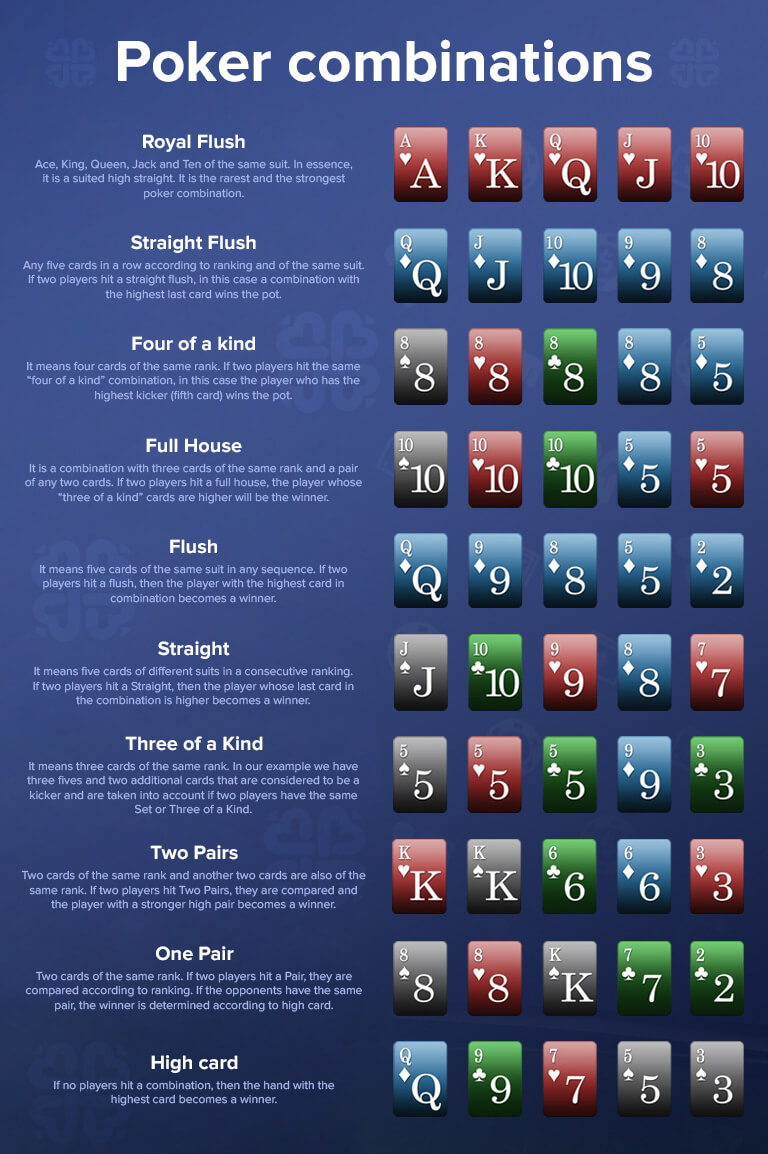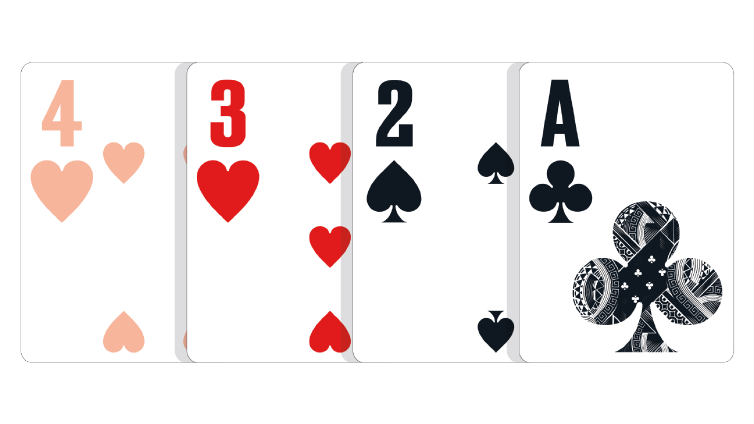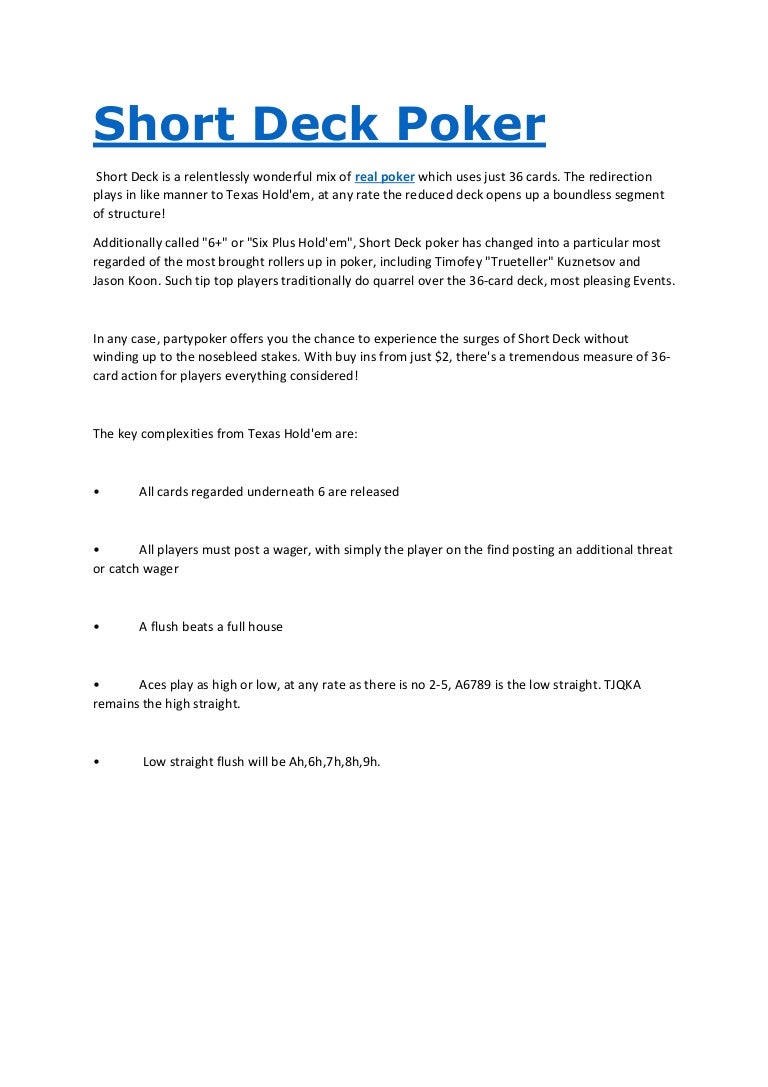Texas Holdem Ace Low Straight


The most usual kind of poker is “high poker” where aces are always high, except the ace can optionally be low for the purpose of making a straight (that is, A-2-3-4-5 is a straight, and so is 10-J-Q-K-A). That is the only exception. Blackjack, craps, roulette and other table games offer higher Return Texas Holdem Rules Ace Low Straight to Player (RTP) percentages overall compared to stingier games like slots. We outline these figures in this guide for our top-rated casinos to help you pick the best places to play games that land you more money. Read our full review. As in a regular straight, you can have an ace either high (A-K-Q-J-T) or low (5-4-3-2-1). However, a straight may not 'wraparound'. (Such as K-A-2-3-4, which is not a straight). An Ace high straight-flush is called a Royal Flush and is the highest natural hand. Four of a Kind Four of a kind is simply four cards of the same rank.

Learning the Poker Hand Rankings is perhaps the most important step for a beginner. It is impossible to play well if you don’t know what you hold in your hand and whether it is likely to win.
To start with you should ensure you understand the High Hand Rankings, as this is used in the most popular variants of poker such as Texas Holdem.
Some variants, such as Razz Poker have a different aim and use the Low Hand Ranking, and some other variants use both the high and the low hand rankings splitting the pot between the players with the best high hand and the best low hand.
The Low Hand Rankings are also explained below however you only need to learn and understand these if you decide to play a poker variant that uses it. If you simple want to play Texas Holdem then you can ignore the Low Hand Rankings.
Texas Holdem Rules Ace Low Straight
High Hand Rankings
There are 10 different high hand rankings in Poker. These are detailed below with number 1 being the best poker hand possible and number 10 being the lowest ranking hand. You’ll never not know the winning poker hand again!
Texas Holdem Ace Low Straight Buddies
Royal flush
This is the highest poker hand. It consists of ace, king, queen, jack and ten, all in the same suit. As all suits are equal, all royal flushes are equal.
Straight flush
Five cards of the same suit in sequence – such as J 10 9 8 7. In the event that two players both hold straight flushes, the one containing the higher top card is ranked higher.
An ace can be counted as low or high, so 5 4 3 2 A is a straight flush, but its top card is the five, not the ace, so it is the lowest type of straight flush. The cards cannot “turn the corner”: eg: K A 2 3 4 is not valid.
Four of a kind
Four cards of the same rank – such as four queens. The fifth card can be anything. This combination is sometimes known as “quads”.
In the event that two players both hold four of a kind, the one with the higher set of four cards is ranked higher.
Full house
This consists of three cards of one rank and two cards of another rank – for example three sevens and two tens (colloquially known as “sevens full” or more specifically “sevens on tens”). When comparing full houses, the rank of the three cards determines which is higher.
For example J-J-J-5-5 beats 9-9-9-A-A. If the threes of a kind were equal, the rank of the pairs would decide.
Flush
Five non sequential cards of the same suit. When comparing two flushes, the highest card determines which is ranked higher. If the highest cards are equal then the second highest card is compared; if those are equal too, then the third highest card, and so on.
For example K-J-9-3-2 beats K-J-7-6-5 because the highest and second highest cards are the same, but with the 3rd highest card the nine beats the seven.
Straight
Five cards of mixed suits in sequence – for example Q J 10 9 8. When comparing two straights, the one with the higher ranking top card is better.
Ace can count as high or low in a straight, with A-K-Q-J-10 being the highest possible straight and A-2-3-4-5 being the lowest possible straight. The cards cannot “turn the corner” eg: K-A-2-3-4 is not valid.
Three of a kind
Three cards of the same rank plus two other cards. This combination is also known as Trips or a Set. When comparing two threes of a kind the hand in which the three equal cards are of higher rank is better.
So for example 5-5-5-3-2 beats 4-4-4-K-Q. If the three of a kind are of the equal rank then you have to compare the higher of the two remaining cards in each hand, and if those are also equal then the lower card is compared.
Two pairs
A pair is two cards of equal rank. In a hand with two pairs, the two pairs are of different ranks (otherwise you would have four of a kind), and there is an odd card to make the hand up to five cards.
When comparing hands with two pairs, the hand with the higher highest pair wins, irrespective of the rank of the other cards – so J-J-2-2-4 beats 10-10-9-9-8 because the jacks beat the tens. If the higher pairs are equal, the lower pairs are compared, so that for example 8-8-6-6-3 beats 8-8-5-5-K.
Finally, if both pairs are the same, the odd cards are compared, so Q-Q-5-5-8 beats Q-Q-5-5-4.
Pair
A hand with two cards of equal rank and three other cards which do not match these or each other.
When comparing two such hands, the hand with the higher pair is better – so for example 6-6-4-3-2 beats 5-5-A-K-Q. If the pairs are equal, compare the highest ranking odd cards from each hand; if these are equal compare the second highest odd card, and if these are equal too compare the lowest odd cards.
So J-J-A-9-3 beats J-J-A-8-7 because the 9 beats the 8.
High card
Five cards which do not form any of the combinations listed above. When comparing two such hands, the one with the better highest card wins. If the highest cards are equal the second cards are compared; if they are also equal the third cards are compared, and so on. So A-J-9-5-3 beats A-10-9-6-4 because the jack beats the ten.
Study these poker hand rankings well and you will find that you get to know them off by heart in no time as you play more and more. It’s important that you know the underlying rules behind the game you are playing and is the first step on your learning curve.
Low Poker Hand Ranking
There are many variants of Poker where the object is not to get the highest poker hand, but in fact the lowest poker hand. These include, but are not limited to Razz, Omaha Hi Lo poker, Stud Hi Low (Eight or Better) and others.

Remember when looking at the low hand rankings to always read your cards from the highest to lowest to avoid misreads and to get the quickest read on the strength of your hand.
The strongest low hand is the hand which has the lowest high card, if the high card is equal then it comes down to the lowest 2nd high card, if they are equal it carries on to the 3rd high card and continues, so for example 7-5-4-2-A beats 7-5-4-3-A because even though the first 3 high cards (7-5-4) are equal the 4th high card of the first hand is a 2 and is lower than the 3 in the second hand. (Don’t worry it’ll soon click when you read the hand rankings below!)

Note: Suits are irrelevant in low hands so it does not matter if the cards are all the same suit or not – Flushes are ignored for the purposes of low hands.
Top 10 Poker Low Hands
Rank 11 to 40 Low Poker Hands
Texas Holdem Ace Low Straight Bourbon Whiskey
- 7-6-3-2-A
- 7-6-4-2-A
- 7-6-4-3-A
- 7-6-4-3-2
- 7-6-5-2-A
- 7-6-5-3-A
- 7-6-5-3-2
- 7-6-5-4-A
- 7-6-5-4-2
- 7-6-5-4-3
- 8-4-3-2-A
- 8-5-3-2-A
- 8-5-4-2-A
- 8-5-4-3-2
- 8-6-3-2-A
- 8-6-4-2-A
- 8-6-4-3-A
- 8-6-4-3-2
- 8-6-5-2-A
- 8-6-5-3-A
- 8-6-5-3-2
- 8-6-5-4-A
- 8-6-5-4-2
- 8-6-5-4-3
- 8-7-3-2-A
- 8-7-4-2-A
- 8-7-4-3-2
- 8-7-5-2-A
- 8-7-5-3-A
- 8-7-5-3-2
Texas Holdem Ace Low Straight Poker
Unless you decide to focus on learning a game that uses the low hand ranks then you are probably best to just ignore them for the moment while you get to grips with the simpler High Hand Rankings that are used in Texas Holdem, which is the variant that we recommend beginners learn to play first.
Texas Holdem Ace Low Straight Talk
Now that you understand the objective and hands you are trying to achieve, we can now move on to learning about the actual rules and procedure involved in playing the most popular variants of poker.